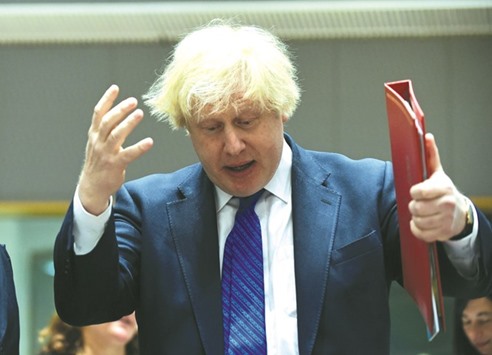European Union governments tightened their Brexit negotiation position as they prepare for talks with the UK over its departure from the bloc.
The EU toughened its language on a future transitional arrangement that would help companies adapt to Britain’s new status, specified demands on citizens’ rights and clarified the role of European courts, according to the latest draft negotiating directives obtained by Bloomberg News.
Any transitional phase, from the time the UK formally exits the EU to the start of a possible trade deal, must be “clearly defined, limited in time and subject to effective enforcement mechanisms,” the draft, dated May 15, said.
The draft directives became public a day after UK Brexit Secretary David Davis rejected the EU’s timetable for the talks and warned there would be a “row” over that as well as arguments over the Irish border and the European Court of Justice’s status in post-Brexit Britain. The negotiating mandate forms the basis of the EU’s approach to the talks, which are scheduled to begin after the UK general election on June 8.
The original draft of the mandate, published by the EU’s Brexit chief Michel Barnier earlier this month, already reinforced the bloc’s hard-line approach to the talks. Barnier demanded the UK “settle its accounts” and accept ECJ oversight.
The latest draft, which has undergone revisions by envoys from the EU’s 27 national governments and is scheduled to be approved by member states yesterday, adds that the ECJ should guarantee the implementation of the Brexit deal. It also emphasises that discussions about future trade in services will not start until there’s been progress on the UK’s financial contributions, Ireland and the rights of EU citizens in the UK and British nationals living in the EU.
Those citizens should be entitled to rights “which are in the process of being obtained, including the possibility to acquire them under current conditions after the withdrawal date,” according to the latest document. The document sets out additional details on the rights to be protected, adding those of free movement, equal treatment in healthcare and access to educational courses for workers’ family members.
Arriving for a foreign ministers’ meeting in Brussels yesterday, UK Foreign Secretary Boris Johnson echoed Davis’s remarks about the need to talk about a future trade deal at the same time as Britain’s withdrawal. “You would expect all of this to be done as a bundle,” he told reporters. “You’ve got to look at the money, the whole thing, the free-trade arrangement; you have to look at that as a package.”

u201cYou would expect all of this to be done as a bundle. You’ve got to look at the money, the whole thing, the free-trade arrangement; you have to look at that as a package,u201d UK Foreign Secretary Boris Johnson told reporters at a foreign ministers’ meeting in Brussels yesterday.
